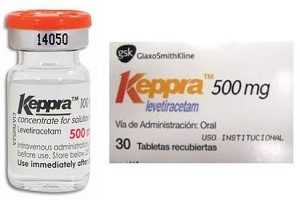Description
WHAT KEPPRA IS AND WHAT IT IS USED FOR
Keppra 500 mg film-coated tablets is an antiepileptic medicine (a medicine used to treat seizures in epilepsy). Keppra is used alone in the treatment of partial seizures in patients from 16 years of age Keppra is used in patients who are already taking another antiepileptic medicine. • in the treatment of partial seizures in adults, children and infants 1 month of age. • in the treatment of myoclonic seizures in patients from 12 years of age with Juvenile Myoclonic Epilepsy. • in the treatment of primary generalised tonic-clonic seizures in adults and adolescents from 12 years of age.
BEFORE YOU TAKE KEPPRA
Keppra is used in adults, children and infants over 1 month of age. Do not take Keppra: • if you are allergic (hypersensitive) to levetiracetam or any of the other ingredients of Keppra. Take special care with Keppra: • if you suffer from kidney problems, follow your doctor’s instructions. He/she may decide if your dose should be adjusted. • No impact on growth and puberty were noticed in children who have taken Keppra. However, there is limited experience on long term effects in children. • If you notice an increase in seizure severity (e.g. increased number), please contact your doctor. • A small number of people being treated with antiepileptics such as Keppra have had thoughts of harming or killing themselves. If you have any symptoms of depression and/or suicidal ideation, please contact your doctor. Taking other medicines: Please tell your doctor or pharmacist if you are taking or have recently taken any other medicines, including medicines obtained without a prescription.
Taking Keppra with food and drink:
You may take Keppra with or without food. As a safety precaution, do not take Keppra with alcohol.
Pregnancy and breast-feeding:
Ask your doctor or pharmacist for advice before taking any medicine. If you are pregnant or if you think you may be pregnant, please inform your doctor. Keppra should not be used during pregnancy unless clearly necessary. The potential risk to your unborn child is unknown. Keppra has shown unwanted reproductive effects in animal studies at dose levels higher than you would need to control your seizures. Breast-feeding is not recommended during treatment.
Driving and using machines:
Keppra may impair your ability to drive or operate any tools or machinery, as Keppra may make you feel sleepy. This is more likely at the beginning of treatment or after an increase in the dose. You should not drive or use machines until it is established that your ability to perform such activities is not affected.
HOW TO TAKE KEPPRA
Dosage in adults and adolescents (12 to 17 years) weighing 50 kg or more: Take the number of tablets following your doctor’s instructions. • General dose: between 1,000 mg (2 tablets) and 3,000 mg (6 tablets) each day. • Keppra must be taken twice a day, once in the morning and once in the evening, at about the same time each day. Example: if your daily dose is 1,000 mg, you must take one tablet in the morning and one tablet in the evening. Give to your child the dosage as instructed by your doctor. Administration: Swallow Keppra tablets with a sufficient quantity of liquid (e.g. a glass of water). Duration of treatment: • Keppra is used as a chronic treatment. You should continue Keppra treatment for as long as your doctor has told you. • Do not stop your treatment without your doctor’s advice as this could increase your seizures. Should your doctor decide to stop your Keppra treatment, he/she will instruct you about the gradual withdrawal of Keppra. If you take more Keppra than you should: Contact your doctor if you took more tablets than you should. If you forget to take Keppra: Contact your doctor if you have missed one or more doses. Do not take a double dose to make up for a forgotten tablet. If you stop taking Keppra: If stopping treatment, as with other antiepileptic medicines, Keppra should be discontinued gradually to avoid an increase of seizures. If you have any further questions on the use of this product, ask your doctor or pharmacist.
POSSIBLE SIDE EFFECTS
Like all medicines, Keppra can cause side effects, although not everybody gets them. Tell your doctor if you have any of the following and they worry you. Very common side effects (> 10 %) reported with Keppra are: • somnolence (sleepiness); • asthenia/fatigue (tiredness). Common side effects (> 1 % – 10 %) reported with Keppra are: • nervous system disorders: dizziness (sensation of unsteadiness), convulsion, headache, hyperkinesia (hyperactivity), ataxia (impaired coordinated movements), tremor (involuntary trembling), amnesia (loss of memory), balance disorder (equilibrium disorder), disturbance in attention (loss of concentration), memory impairment (forgetfulness); • psychiatric disorders: agitation, depression, emotional instability/ mood swings, hostility or aggression, insomnia, nervousness or irritability, personality disorders (behavioral problems), thinking abnormal (slow thinking, unable to concentrate); • digestive disorders: abdominal pain, nausea, dyspepsia (indigestion), diarrhoea, vomiting; • nutrition disorders: anorexia (loss of appetite), weight increase; • ear and labyrinth disorders: vertigo (sensation of rotation); • eye disorders: diplopia (double vision), vision blurred; • musculoskeletal and connective tissue disorders: myalgia (muscle pain); lets. Other side effects reported with Keppra are: • nervous system disorders: paraesthesia (tingling) • psychiatric disorders: abnormal behaviour, anger, anxiety, confusion, hallucination, mental disorder; suicide, suicide attempt and suicidal ideation; • digestive disorders: pancreatitis, hepatic failure, hepatitis, liver function test abnormal; • nutrition disorders: weight loss; • skin disorders: hair loss, blistering of the skin, mouth, eyes and genital, skin eruption; • blood disorders: decreased number of red blood cells, and/or white blood cells. Some of the side effects like sleepiness, tiredness and dizziness may be more common at the beginning of the treatment or at dosage increase. These effects should however decrease over time. If any of the side effects gets serious, or if you notice any side effects not listed in this leaflet, please tell your doctor or pharmacist.
HOW TO STORE KEPPRA
Keep out of the reach and sight of children. • This medicinal product does not require any special storage conditions. Do not use after the expiry date stated on the carton box and blister after EXP:… The expiry date refers to the last day of the month.





Reviews
There are no reviews yet.